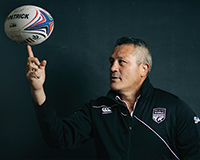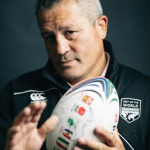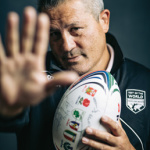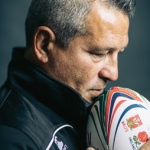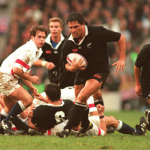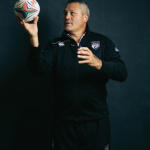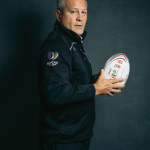Former All Black Zinzan Brooke experienced plenty of hard knocks over a decade-long international rugby career – which stood him in good stead when his property company was hit by the recession
Zinzan Brooke is distracted – by 112 unread Whatsapp messages. “Can you believe that?” he asks, in what becomes the first of a series of entirely rhetorical questions. “That is ridiculous, isn’t it, 112 messages?” His phone bleeps again. “Now 113! Look at these ones… sent at 2am from Mahiki nightclub. Do you want to see a video of Brian McFadden from Westlife singing one of his own songs in a karaoke bar?”
The former All Black number 8 again doesn’t wait for an answer. No sooner has the question been asked than a somewhat slurred version of Flying Without Wings, recorded circa 1am the night before, is blasting out of his phone for everyone in the Twickenham Marriott Hotel bar to hear.
Not that anyone seems too bothered. In fact, as a chorus of cheers erupts around the room, it becomes clear that most of the people sitting in huddles around the tables are either international sports personalities or celebrities, that pretty much all of them are nursing hangovers, and that these are the culprits collectively responsible for the 113 messages.
It is two weeks before the first Rugby World Cup game kicks off and they are here to take part in the inaugural Rugby Aid for Heroes charity match that evening – England v Rest of the World.
Brooke is here as coach for the latter. Despite the fragile state of his team that morning, they went on to win 36-29.
That could, of course, be testament to the calibre of their coach. Brooke’s reputation as one of the greatest All Black players of all time is still what he is best known for. But since moving to the UK in 1997, he has also been building a property empire – though it has been far from plain sailing. In fact, it has arguably been more bruising than an 11-year stint in international rugby and one that forced him to declare himself bankrupt in 2012.
Here the 50-year-old Kiwi talks about the career that took him from pitch to property and reveals why no one should ever get between a sportsperson and an ice bath.
International debut
After years playing for the Auckland under-17s, Brooke, aged 21, was in the middle of laying a roof when a call came from the manager of the All Blacks asking him to try out. He made his international rugby debut in 1987 and swiftly became one of the most prolific players in recent history, winning 58 caps in more than a decade on the field. He is perhaps best known for scoring a legendary 47-metre drop goal against England in the 1995 World Cup, of which he says: “I had done it loads in my back yard. It didn’t feel much different, to be honest. Just a few more people watching.”
Within just three years, he went from churning butter and milking cows on a farm in south-west Auckland – “I was one of five kids and, my God, you should have seen where we grew up; we were a bunch of hillbillies” – to becoming an international sporting hero. “If you have ever wanted to be a rock star and go on the road and tour with a bunch of mates, this is it. It’s the thing. The ultimate. You are with one of the best teams in the world. You are an All Black.”
Would he do it again? “No. No. God no. Absolutely not. No.” Seems definitive. “It was amazing at the time. I played for 11 years. But that’s long enough. Playing at that level comes with a lot of commitment and sacrifice. And the pain got to me.”
Pain and gain
And the most painful thing during all those years at the top? His answer is priceless, and one you can get away with once you are well and truly out of the game. “Corporate hospitality,” he says, visibly tensing as he rolls his eyes.
“You come off the pitch, you are bashed up and you need ice packs all over your body. But you know that, instead, you have to chat to a corporate guy who is part of the sponsorship. You know you have to be there but you think ‘for me to be ready for next week, I need to be in an ice bath and having a massage’. That can be very frustrating and painful.”
And his most stomach-churning on-pitch memory? His debut game playing number 8 against Argentina in the 1987 World Cup. “At the time, you think a game’s a game,” he says. “But the level of intensity between a domestic and an international is completely different. I woke up at five on that morning and there wasn’t a split second between waking up and feeling the fear. It hit me instantly. The moment I opened my eyes, I felt sick. And when I came out onto that pitch? I was so scared. I was 21, my first international game and the first time I had ever played outside flanker, which is such a specialised position.”
And despite saying his time on the pitch has been and gone, Brooke does concede that when World Cup season comes around, he gets nostalgic. “It does bring it all back,” he says.
“Having done it myself for so long, I can imagine what all the guys who are playing are going through now. Just two weeks out. And while I would never do it again, it does bring back good memories. Playing rugby on this scale? And at this level? It doesn’t get much better.”
Pitch to property
When Brooke retired from international rugby in 1997, he moved to England to play for, and later coach, Harlequins before moving into the world of property. And if rugby left him battered, then his real estate career has been just as bruising, if not more so.
He set up Valentines Homes in 2002 which, at its peak, was running as a £12m-turnover business delivering a mixture of new-build and refurbished apartments in and around London and Windsor. He was forced to shelve the business in 2008 as the market dried up and it went into liquidation in July 2011. Brooke tried a change of tack and focused instead on his property recruitment company, Number 8 Group. But it was not enough to keep his head above water and, with six children under the age of 10 to support, in September 2012 he declared himself bankrupt. “We were focused on residential property and developing flats in and around London and suddenly Armageddon hit. I will be honest. I thought that recession would last maybe two years. Not seven. It was hell.”
It has been a long journey back from that point for Brooke and his wife, Ali. He has diversified again from pure property development – this time to incorporate a demolition element into his business which, along with an improving economy, he says has helped pull the company back onto a growth trajectory. “The property side of things is actually going OK now,” he says, albeit gingerly. “Diversifying was the key to that. We had no choice. I was working on all those flats and apartments and nothing was selling. And I am glad to see the economy looks much flatter now. I don’t like spikes. London remains our key focus and we are based out of a Chiswick office at the moment. We have 14 people working for the company. If demand increases, there is the potential to expand. I am just relieved we are back on our feet. It was a major rough patch. But we have served our time. And as a small property business at the height of one of the worst recessions this country has ever seen, we weren’t alone.”
Recovery
Once upon a time, it might have been fair to assume that it would take more than a crash in the housing market to knock a man like Brooke off his feet. Unfortunately, it did just that. And so he says there is no choice but to focus on recovery.
“You dust yourself off. That’s what we have done. It is what we had to do. That’s life. And, actually, that’s rugby. So I had a bit of practice.”
Zinzan’s 2015 World Cup predictions
“[England coach] Stuart Lancaster has a bit of a situation on his hands. Sam Burgess [who made his international rugby debut in August] needs game time and I think Lancaster will be forced to play him in the opening game against Fiji. Because I would not want to trial him against Wales or Australia.
“On that note, I would warn everyone to watch out for Fiji. You take your eye off the ball there and you could be in trouble – it is a potential banana skin. They have one win in them. It could be against England in the first game. It might happen.
“We saw it in the last World Cup when Tonga beat France. There was a massive upset, the French were completely shocked. But Tonga deserved to win that game. There is no reason why these things can’t happen.
“As for the pool of death that England are in, the powers that be need to rectify the pooling system. That shouldn’t happen. My suggestion would be, rather than pooling a year after the World Cup, I think 18 months out should be the cut-off point. That’s when ranking systems should apply to get groupings right.
“On a winner? I think it is New Zealand’s to lose.”







